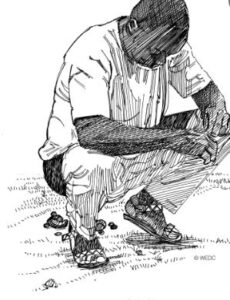Afrobeat maestro, Fela Anikulapokuti’s song that Africans shit inside big- big hole reminded me that we rarely saw our stools in the past. Unlike now that we can see and scrutinize the poo-poo in our WC, the few times we saw our poops back in the day was when we did it in the open.

So, the advent of the Water Closet (WC) where we sat comfortably rather than squatted to answer the call of nature became so fascinating and exciting to both young and old that all kinds of reasons were given to stay longer on the shits.
Well, apart from offering convenience, the WC also offers the grace to see and scrutinize the stools. And this brings us to the subject matter- Your stools and Your Health.
Your fecal matter’s texture, shape, colour, odor, size, frequency, duration, and appearance give insights into your health status.
Poop /stool or fecal matter is the end part of the digestive process. It consists of waste products, including undigested food particles, bacteria, salts, and other substances that the body eliminates.
Gastroenterologist, Anish Sheth, the co-author of the book What’s Your Poo Telling You? Says it’s important to talk about bowel movement because your poop (stool) is an important clue to your overall digestion and health: Your poop can reveal serious signs of infections, digestive problems, and even early signs of cancer.
It’s Brown
Poops are normal when they come in any shade of brown color. According to experts, the combination of bile and bilirubin during the digestive process gives poops shades of brown colour. Poops become abnormal when they come out in distinctively non-brown colour.
White, Grey, or Pale Stool: Some medications including antidiarrheal drugs can make poop white. But when you are not on medications and you expel poops in those colours, consult physicians. Doctors say they may be a pointer to liver or gallbladder issues. The pale stool is also suggestive of a lack of bile.
Black stools:
Some iron supplements, black licorice, black stout, and bismuth medications can make poop black. However black stool will become an issue when you are off these substances and you still expel black stool. Medical experts and journals say black stools especially if they have the appearance of tar, suggest gastrointestinal bleeding. See your doctor immediately.
Green
Green poop might sometimes be caused by your ingestion of green foods such as avocado, green tea, green leafy vegetables, green juices, etc, but when green poop is persistent it may mean too much bile or too low bilirubin in your digestive process. Too much bile or too low bilirubin are issues of health concern that require medical consultation.
Red
Eating beets or red berries or drinking beet or tomato juice can turn poop to red. Once these foods have passed through the digestive tract, poop should become brown again. Continuous red poop may indicate lower gastrointestinal bleeding and or hemorrhoids.
Orange
Ingesting many orange-colored foods, that are rich in beta-carotene, a pigment substance can make stool come in orange colour. Common foods that contain the pigment are carrots and sweet potatoes
However, experts and medical journals say blocked bile ducts or certain medications, including some antacids and antibiotics, can cause orange poop. Adding that if your orange stool has become frequent, consult a physician.
Yellow
Greasy, stinky, yellow stool is typically a sign of too much fat. This, according to experts could also be a direct relation to a malabsorption disorder like celiac disease, where your body isn’t absorbing enough nutrients. It could also signify a condition called giardiasis, which is caused by an intestinal parasite contacted through contaminated water or exposure to a person with the condition.
Gastroenterologists say most people will experience variations in stool color at some stage. According to them, this is due to diet or some other minor cause. However, anyone who experiences changes in poop color that last 2 or more weeks or has red or black stool should consult a doctor.
Does it float?
Do your poops stay afloat in the water after flushing? Do you need an extra bucket of water to completely flush the floating poop(s), experts say this might be an indication of high-fat content, which can be a sign of malabsorption, a condition in which you can’t absorb enough fat and other nutrients from the food you’re ingesting. It may also be a symptom of celiac disease or chronic pancreatitis. Celiac disease is a chronic digestive and immune disorder that damages the small intestine. The disease is triggered by eating foods containing gluten. The disease can cause long-lasting digestive problems and keep your body from getting all the nutrients it needs.
Hey! Do not press the panic button or get despair yet because floating poops might just mean there is too much gas in your intestine. This may mean that you swallow air or you eat a high fiber diet with a lot of vegetable and fruits. Experts say high-fiber foods release more air and gas during digestion and that the gas and air may be trapped in the stool making it to float in the bowl
Melinda Ratini, of WebMD says Floating stools don’t necessarily mean you have an underlying health condition. To determine if a health condition is causing your poops to float, your stools must be smelly, sticky, or bloody. When these happen, consult your doctor immediately.
Source: Dare Agbeluyi, Chief Publisher.
Publisher’s Note:
- Leave your comments in the comments box below and share the post
- Send your health- related articles, stories, tips to compack2006@yahoo.co.ukfor free publication
- Like and share our Facebook page: @citizencomfortng
- Follow us on Instagram: citizencomfort01_ng